Do Donkeys Attack Humans ? Donkeys have been companions to humans for thousands of years. From carrying loads across rocky terrain to offering companionship on farms, they have proven themselves as reliable and hard-working animals. But one common misconception that many people hold is that donkeys are inherently dangerous and prone to attack humans. This is far from the truth.
While donkeys can exhibit aggression in certain circumstances, understanding their behavior is crucial in debunking this myth and ensuring safe interactions. In this comprehensive guide, we’ll take a deep dive into donkey behavior, how they react to different situations, and whether they really do attack humans. By the end of this article, you’ll have a well-rounded understanding of the facts and myths about donkey aggression and how to keep yourself and others safe when interacting with these fascinating animals.
What Are Donkeys?

The Basics of Donkeys
Donkeys, scientifically known as Equus asinus, are members of the Equidae family, which also includes horses and zebras. These domesticated animals are smaller and stockier than horses, with long ears, a short mane, and a tail resembling that of a horse. There are different breeds of donkeys, including the more common domestic varieties, as well as wild species like the African wild ass.
Donkeys have been utilized by humans for thousands of years, dating back to around 3000 BC in ancient Egypt. Over time, donkeys became essential pack animals and a symbol of strength and endurance. Their ability to survive in harsh environments and carry heavy loads made them an indispensable companion for many cultures.
Donkey Characteristics
- Herbivores: Donkeys are strict herbivores, meaning they only eat plant material like grass, hay, and shrubs. Their diet is high in fiber and low in protein, which supports their long-term endurance.
- Endurance Animals: Donkeys are known for their incredible stamina. They can travel long distances across rough terrain without tiring, which made them perfect for transportation before modern vehicles.
- Cautious Nature: One of the key features of donkeys is their cautious nature. They are not known for being overly aggressive unless there is a clear reason for it. This trait makes them ideal for carrying loads across difficult terrain, as they will carefully choose their footing.
- Social Behavior: Donkeys are social animals that form strong bonds with other donkeys, especially when raised together. In the wild, donkeys live in herds that are led by a dominant individual. These social structures help protect them from predators and give them a sense of security.
See Also : Do Kangaroos Attack Humans?
Do Donkeys Attack Humans?

Now that we’ve covered the basic characteristics of donkeys, let’s address the main question: do donkeys attack humans?
The Truth About Donkey Aggression
Donkeys, like any other animal, have the capacity to become aggressive. However, it’s essential to understand that donkeys do not inherently attack humans without provocation. They are generally gentle animals that are more likely to defend themselves or their territory than to initiate an attack.
Most donkeys are not naturally inclined to violence. Instead, aggression typically arises when they feel threatened, scared, or in pain. That said, donkeys have been misunderstood throughout history, often painted as stubborn, aggressive creatures because they can be more cautious or independent compared to horses.
What Triggers Donkey Aggression?
Donkeys are naturally territorial animals, and their aggression usually stems from one of the following reasons:
- Fear: Donkeys are incredibly sensitive to their environment and may react aggressively when startled or frightened. If they perceive a human as a threat—whether through loud noises, fast movements, or sudden approaches—they may respond defensively. This fear-driven aggression is more likely to occur if the donkey has had negative experiences with humans in the past.
- Pain or Discomfort: Donkeys can become defensive if they are in pain. Whether due to injury, illness, or discomfort from poor living conditions, a donkey may act out when it feels vulnerable. This type of aggression can be more difficult to predict, as donkeys may not show visible signs of injury until the situation escalates.
- Self-Defense: Like many animals, donkeys will defend themselves if they feel cornered or trapped. If they have nowhere to retreat, they may use aggressive behaviors such as biting, kicking, or lunging to protect themselves.
- Protecting Young: Female donkeys, particularly mothers, can be extremely protective of their offspring. If they feel their young are at risk, they may become aggressive to ward off potential threats. This protective behavior is seen across many species, and donkeys are no exception.
- Territorial Aggression: Donkeys have a strong sense of territory. They will defend their space against perceived intruders, including humans. If a donkey feels that its personal space is being encroached upon, it may react aggressively as a means of establishing boundaries.
- Lack of Proper Socialization or Training: Donkeys that have not been properly socialized or trained may be more likely to exhibit aggressive behaviors. Lack of interaction with humans and other animals can result in donkeys feeling threatened or unsafe, leading to fear-driven aggression.
See Also : Do Dingoes Attack Humans? Understanding the Risks!
Understanding Donkey Aggression
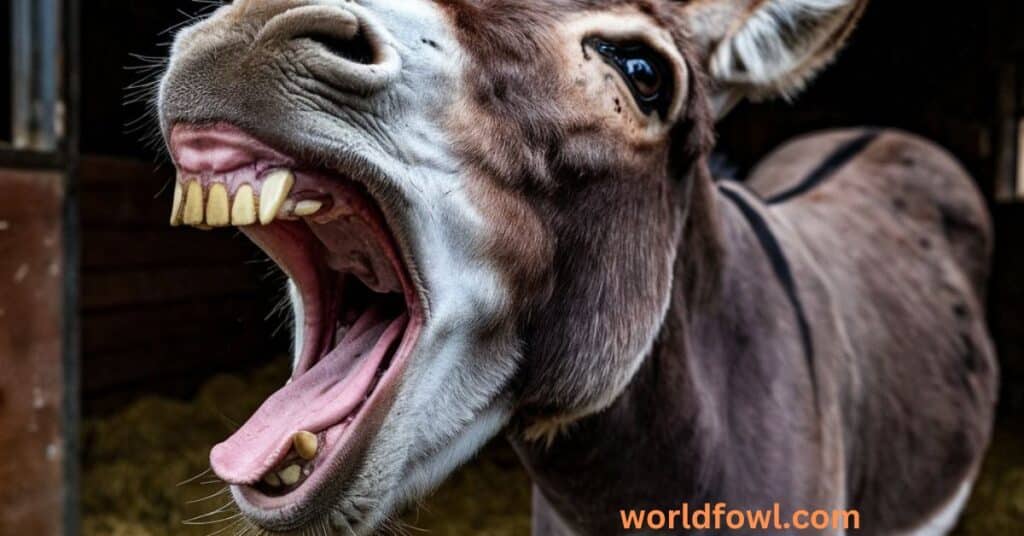
Aggression in donkeys is often a form of defensive behavior, rather than an indication of inherent malice. However, recognizing the signs of aggression and understanding why donkeys may react in this way can help prevent unpleasant situations.
Types of Donkey Aggression
- Territorial Aggression: As mentioned, donkeys are territorial creatures. When a donkey feels its space is being invaded, it may display aggressive behavior. This is especially common in male donkeys that are trying to establish dominance or in female donkeys with young foals.
- Defensive Aggression: This type of aggression occurs when a donkey feels physically threatened or trapped. It’s often a reaction to fear, pain, or a perceived danger. A defensive donkey may bite, kick, or charge in an attempt to ward off the threat.
- Protective Aggression: Female donkeys with foals or donkeys in herds may become aggressive if they feel their loved ones or group are in danger. This is a survival mechanism that is deeply ingrained in the donkey’s nature.
- Pain-Induced Aggression: Donkeys that are in pain, whether from a medical condition, injury, or discomfort, may exhibit aggressive behavior as a way of protecting themselves. For example, if a donkey’s hoof is sore or if it’s being improperly saddled, it may lash out to prevent further pain.
See Also : Do Hippos Attack Humans? Deadly Secret!
Signs of Aggressive Behavior in Donkeys
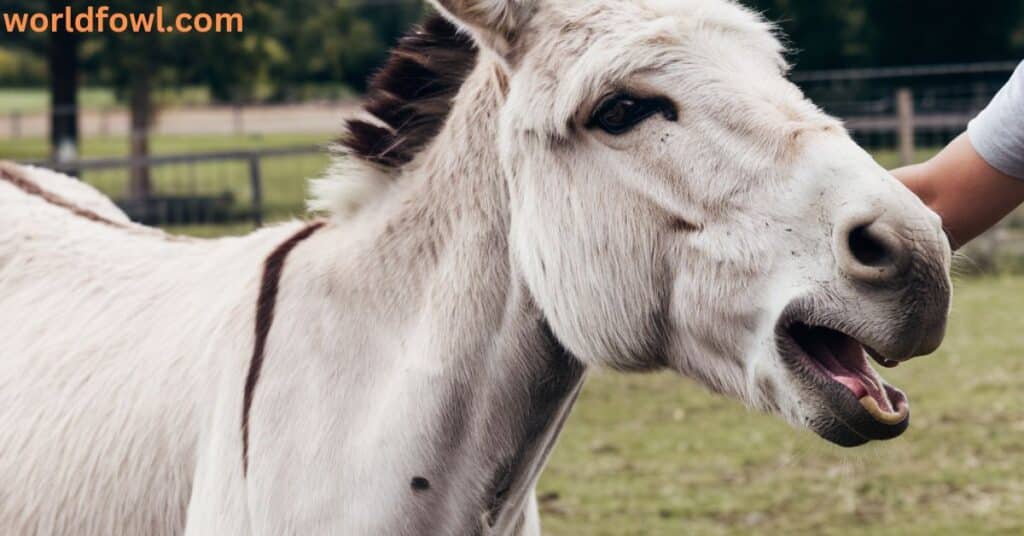
If you’re working with or around donkeys, it’s crucial to recognize the signs of aggression before things escalate. Donkeys communicate through body language, and understanding these signals can help you avoid confrontations.
Warning Signs of Aggression
- Pinned Ears: One of the most obvious signs of a donkey’s irritation is when its ears are pinned back against its head. This is a clear indication that the donkey is feeling threatened, annoyed, or angry.
- Tail Swishing or Lashing: A donkey’s tail is an essential tool for communication. When a donkey begins to swish or lash its tail rapidly, it’s a sign of agitation. This could be a warning that the donkey is upset and may become aggressive if provoked further.
- Baring Teeth: If a donkey shows its teeth or snaps, it’s a clear sign that it is preparing to bite. Baring teeth is a precursor to a bite, and you should immediately back away if you notice this behavior.
- Foot Stomping: Donkeys often stomp their feet to signal frustration or anger. While it’s not always an immediate precursor to an attack, foot stomping is a strong signal that the donkey is upset and could become aggressive.
- Lunging or Charging: In more extreme cases, a donkey may charge at a perceived threat. Lunging or charging is usually a last resort behavior when the donkey feels that its territory or safety is in immediate danger.
See Also : Do Squirrels Eat Bird Eggs?
Why Might a Donkey Attack?
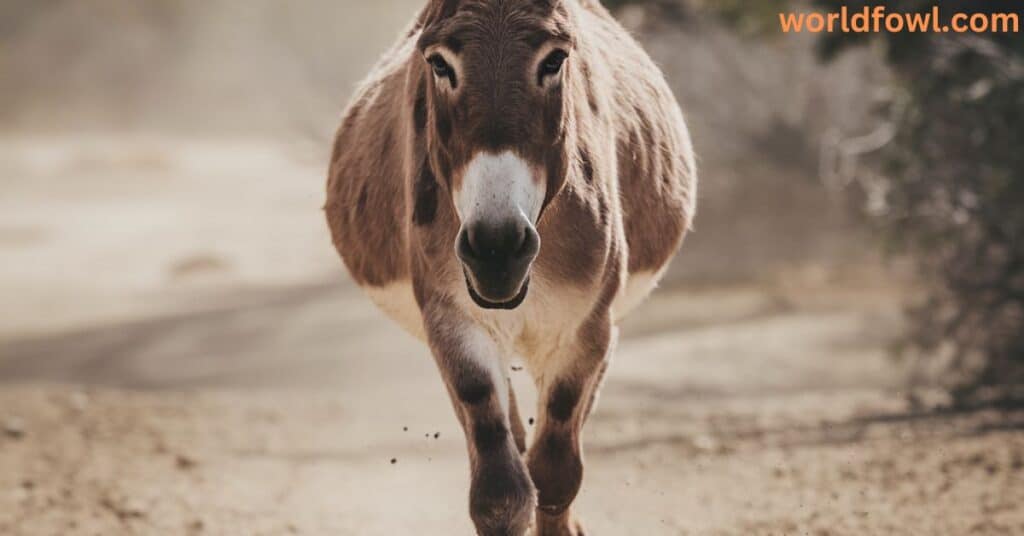
While rare, donkey attacks do happen, and they usually arise from a mix of fear, pain, territorial instincts, or poor handling. Here’s a deeper look into the factors that may provoke a donkey to act aggressively:
Common Triggers for Donkey Aggression
- Fear: As herbivores, donkeys are prey animals, and they instinctively fear anything they perceive as a potential threat. Sudden movements, loud noises, or unfamiliar environments can make them feel anxious, leading to aggressive behavior.
- Pain or Discomfort: If a donkey is injured or in discomfort, it might become defensive and aggressive. Physical pain can make an otherwise gentle animal react in ways it normally wouldn’t.
- Feeling Trapped or Cornered: Donkeys that are unable to escape from a situation may resort to aggressive behavior as a means of self-preservation. If a donkey feels there is no way out, it might try to fight its way out by kicking or biting.
- Protecting Offspring: Female donkeys, especially mothers, are extremely protective of their young. If a human or another animal approaches their foals in a way that seems threatening, a donkey will often act aggressively to defend them.
- Lack of Training or Socialization: Donkeys that have not been properly socialized may have a poor understanding of human behavior and could react aggressively out of confusion or fear. Early exposure to humans and other animals helps donkeys learn how to interact appropriately.
See Also : How and Where Do Geese Sleep? The Secrets of Goose Slumber
How to Stay Safe Around Donkeys
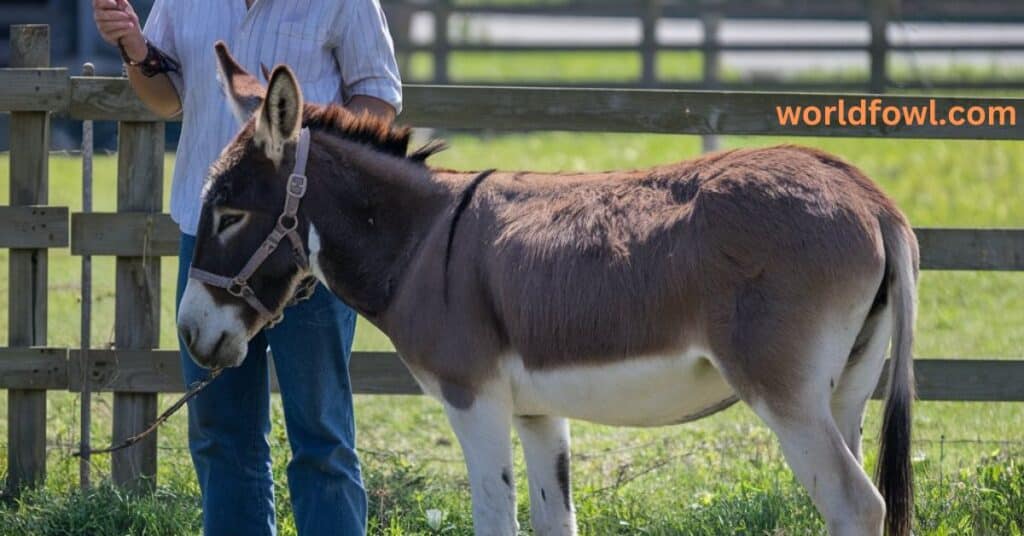
Interacting with donkeys requires respect, understanding, and patience. Donkeys are not dangerous by nature, but improper handling or failing to recognize warning signs can lead to aggressive encounters.
Tips for Staying Safe:
- Approach Calmly and Slowly: Donkeys can be startled easily. Always approach them slowly and allow them to see and sniff you before attempting to touch them.
- Respect Their Space: Donkeys are territorial animals, so it’s important not to crowd them or invade their space. Give them room to move and interact with them at their own pace.
- Observe Body Language: Learn to recognize the warning signs of aggression. If a donkey is showing signs of distress, such as pinned ears, tail swishing, or foot stomping, back away calmly and give the animal space.
- Avoid Sudden Movements: Donkeys can be easily startled by fast movements. Avoid waving your arms or making sudden jerks in your approach.
- Use Positive Reinforcement: When training or interacting with donkeys, always use positive reinforcement. Reward calm and appropriate behavior with treats or praise to encourage them to remain relaxed.
- Ensure Proper Veterinary Care: Donkeys should receive regular veterinary care to ensure they are healthy and free from pain. Donkeys in pain or discomfort are more likely to react aggressively.
See Also : Do Quolls Attack Humans? Silent Predators
Can Donkeys Be Trained to Be Less Aggressive?
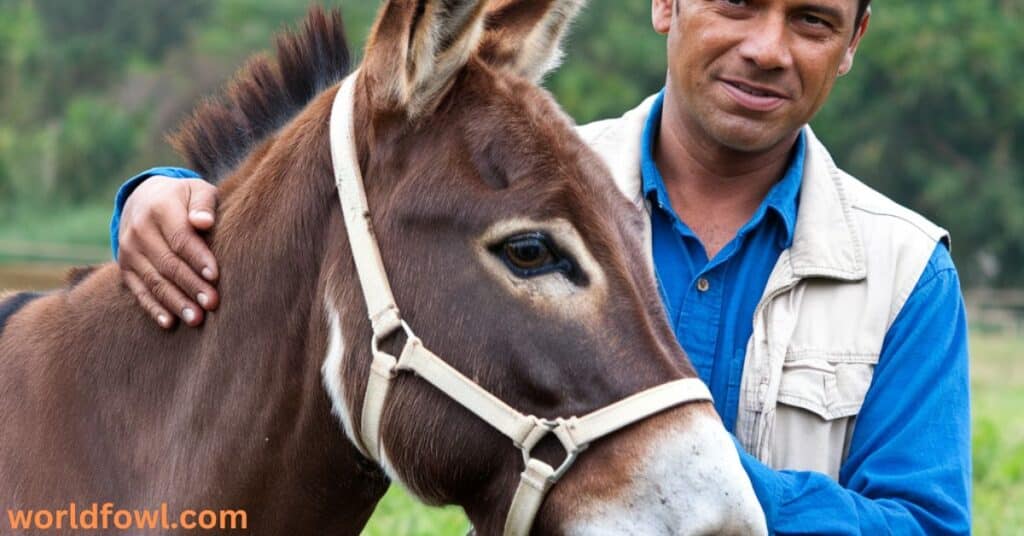
Yes, donkeys can be trained to reduce aggressive behaviors, and proper training can help make them safer to interact with. However, training a donkey requires patience, consistency, and understanding of the animal’s nature.
Training Techniques for Aggressive Donkeys
- Positive Reinforcement: Rewarding good behavior is one of the most effective ways to train a donkey. Positive reinforcement can help donkeys associate calm behavior with rewards such as treats or praise.
- Gradual Exposure: If a donkey is fearful of certain situations or people, gradual exposure can help desensitize it to those triggers. This should be done in a calm, controlled environment.
- Socialization: Donkeys that are socialized early in life are less likely to exhibit fear-driven aggression. Regular interaction with humans and other animals helps donkeys learn to trust and understand their environment.
- Desensitization: Slowly exposing donkeys to new environments, sounds, and experiences in a controlled manner can help them adapt without reacting aggressively.
With proper training, donkeys can become more comfortable around humans and exhibit less aggression. However, it’s important to note that each donkey is different, and the training process may take time.
FAQs
Do Donkeys Bite?
Yes, donkeys can bite, but it’s not common unless they feel threatened or provoked. A donkey may bite to defend itself or its territory, but this behavior can generally be avoided with proper handling.
Are Donkeys Dangerous to Children?
Donkeys are generally not dangerous to children, but like any animal, they should be treated with respect. Children should be taught how to interact safely with donkeys and should always be supervised around them.
How Do You Calm an Agitated Donkey?
To calm an agitated donkey, speak softly, avoid sudden movements, and give it space. Gradual desensitization and positive reinforcement can also help calm an agitated donkey over time.
What Should You Do If a Donkey Attacks?
If a donkey attacks, it’s important to remain calm and try to get away from the situation slowly. Protect your vulnerable areas, such as your face and torso, and seek help immediately. Understanding the warning signs and staying out of danger can prevent most attacks.
Conclusion: Do Donkeys Attack Humans?
In conclusion, donkeys do not attack humans unless provoked or placed in a situation where they feel threatened. While donkeys are capable of aggressive behavior, they are typically peaceful animals that prefer to avoid confrontation. Understanding the factors that contribute to donkey aggression, such as fear, pain, and territorial instincts, can help prevent dangerous situations.
By recognizing the warning signs of aggression, approaching donkeys calmly, and using positive reinforcement, you can build a safe and trusting relationship with these remarkable animals. Donkeys are not inherently dangerous, and with proper care and training, they can be loyal companions for years to come.
Whether you’re a farmer, animal lover, or simply curious, understanding donkey behavior will ensure that your interactions with these animals are safe and enjoyable. So, the next time someone asks, “Do donkeys attack humans?” you’ll be able to confidently say, “No, but they do need to be treated with respect and care.”

Henry James is a seasoned blogger and a passionate storyteller on “World Fowl.” With years of experience crafting engaging content, he brings a unique blend of expertise and creativity to his writing. Henry specializes in exploring diverse topics with depth and clarity, captivating readers worldwide.







